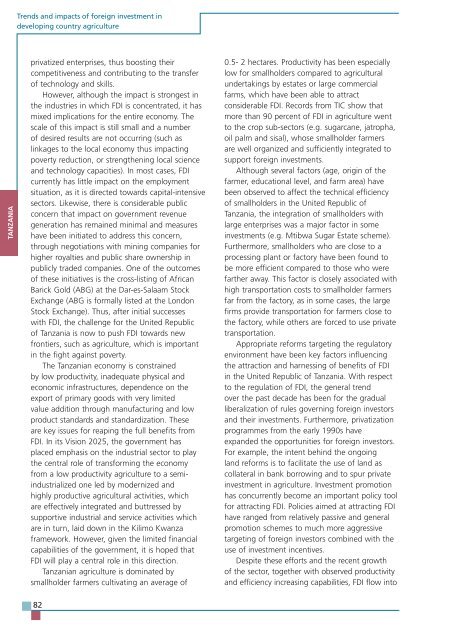TRENDS AND IMPACTS OF FOREIGN INVESTMENT IN DEVELOPING COUNTRY AGRICULTURE
TRENDS AND IMPACTS OF FOREIGN INVESTMENT IN DEVELOPING COUNTRY AGRICULTURE
TRENDS AND IMPACTS OF FOREIGN INVESTMENT IN DEVELOPING COUNTRY AGRICULTURE
You also want an ePaper? Increase the reach of your titles
YUMPU automatically turns print PDFs into web optimized ePapers that Google loves.
TANZANIA<br />
Trends and impacts of foreign investment in<br />
developing country agriculture<br />
privatized enterprises, thus boosting their<br />
competitiveness and contributing to the transfer<br />
of technology and skills.<br />
However, although the impact is strongest in<br />
the industries in which FDI is concentrated, it has<br />
mixed implications for the entire economy. The<br />
scale of this impact is still small and a number<br />
of desired results are not occurring (such as<br />
linkages to the local economy thus impacting<br />
poverty reduction, or strengthening local science<br />
and technology capacities). In most cases, FDI<br />
currently has little impact on the employment<br />
situation, as it is directed towards capital-intensive<br />
sectors. Likewise, there is considerable public<br />
concern that impact on government revenue<br />
generation has remained minimal and measures<br />
have been initiated to address this concern,<br />
through negotiations with mining companies for<br />
higher royalties and public share ownership in<br />
publicly traded companies. One of the outcomes<br />
of these initiatives is the cross-listing of African<br />
Barick Gold (ABG) at the Dar-es-Salaam Stock<br />
Exchange (ABG is formally listed at the London<br />
Stock Exchange). Thus, after initial successes<br />
with FDI, the challenge for the United Republic<br />
of Tanzania is now to push FDI towards new<br />
frontiers, such as agriculture, which is important<br />
in the fight against poverty.<br />
The Tanzanian economy is constrained<br />
by low productivity, inadequate physical and<br />
economic infrastructures, dependence on the<br />
export of primary goods with very limited<br />
value addition through manufacturing and low<br />
product standards and standardization. These<br />
are key issues for reaping the full benefits from<br />
FDI. In its Vision 2025, the government has<br />
placed emphasis on the industrial sector to play<br />
the central role of transforming the economy<br />
from a low productivity agriculture to a semiindustrialized<br />
one led by modernized and<br />
highly productive agricultural activities, which<br />
are effectively integrated and buttressed by<br />
supportive industrial and service activities which<br />
are in turn, laid down in the Kilimo Kwanza<br />
framework. However, given the limited financial<br />
capabilities of the government, it is hoped that<br />
FDI will play a central role in this direction.<br />
Tanzanian agriculture is dominated by<br />
smallholder farmers cultivating an average of<br />
82<br />
0.5- 2 hectares. Productivity has been especially<br />
low for smallholders compared to agricultural<br />
undertakings by estates or large commercial<br />
farms, which have been able to attract<br />
considerable FDI. Records from TIC show that<br />
more than 90 percent of FDI in agriculture went<br />
to the crop sub-sectors (e.g. sugarcane, jatropha,<br />
oil palm and sisal), whose smallholder farmers<br />
are well organized and sufficiently integrated to<br />
support foreign investments.<br />
Although several factors (age, origin of the<br />
farmer, educational level, and farm area) have<br />
been observed to affect the technical efficiency<br />
of smallholders in the United Republic of<br />
Tanzania, the integration of smallholders with<br />
large enterprises was a major factor in some<br />
investments (e.g. Mtibwa Sugar Estate scheme).<br />
Furthermore, smallholders who are close to a<br />
processing plant or factory have been found to<br />
be more efficient compared to those who were<br />
farther away. This factor is closely associated with<br />
high transportation costs to smallholder farmers<br />
far from the factory, as in some cases, the large<br />
firms provide transportation for farmers close to<br />
the factory, while others are forced to use private<br />
transportation.<br />
Appropriate reforms targeting the regulatory<br />
environment have been key factors influencing<br />
the attraction and harnessing of benefits of FDI<br />
in the United Republic of Tanzania. With respect<br />
to the regulation of FDI, the general trend<br />
over the past decade has been for the gradual<br />
liberalization of rules governing foreign investors<br />
and their investments. Furthermore, privatization<br />
programmes from the early 1990s have<br />
expanded the opportunities for foreign investors.<br />
For example, the intent behind the ongoing<br />
land reforms is to facilitate the use of land as<br />
collateral in bank borrowing and to spur private<br />
investment in agriculture. Investment promotion<br />
has concurrently become an important policy tool<br />
for attracting FDI. Policies aimed at attracting FDI<br />
have ranged from relatively passive and general<br />
promotion schemes to much more aggressive<br />
targeting of foreign investors combined with the<br />
use of investment incentives.<br />
Despite these efforts and the recent growth<br />
of the sector, together with observed productivity<br />
and efficiency increasing capabilities, FDI flow into


